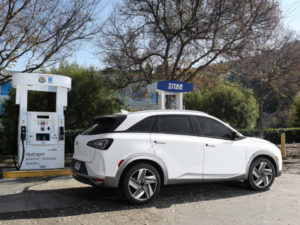Hyundai and Audi deal to further fuel cell tech development
Hyundai and Audi are partnering to develop joint fuel cell technologies for future models in a move to accelerate the fuel cell electric vehicle market.

The Hyundai-Audi deal will see Kia and Volkswagen Audi Group benefit from shared fuel cell know-how
The deal will give Audi – along with other Volkswagen Group brands – the opportunity to benefit from Hyundai’s expertise in developing FCEV technologies; the carmaker has started sales of its Nexo fuel cell SUV, the successor to the ix35, in select global markets this year.
Audi’s work in fuel cell tech is now in its sixth generation and has included the development of the h-tron quattro hybrid fuel cell concept unveiled at the 2016 Detroit motor show. It’s planning to introduce its first fuel cell model as a small series production SUV from 2020.
The agreement between the two carmakers includes a multi-year patent cross-licensing agreement, covering a range of FCEV components and technologies, and is expected to benefit Kia and Volkswagen too. Terms have not been disclosed.
The partnership will also extend beyond patent sharing and will look to lead industry standards in fuel cell technology as well as accelerate FCEV development and innovations.
It’s also expected to strengthen competiveness for Hyundai’s Mobis fuel cell components business
“This agreement is another example of Hyundai’s strong commitment to creating a more sustainable future whilst enhancing consumers’ lives with hydrogen-powered vehicles, the fastest way to a truly zero-emission world,” said Euisun Chung, Vice Chairman at Hyundai Motor Company. “We are confident that the Hyundai Motor Group-Audi partnership will successfully demonstrate the vision and benefits of FCEVs to the global society.”
The agreement marks the latest deal between carmakers to mutually develop greener technologies, cutting costs and time to market while also benefiting the wider car industry through increased innovations. This includes Toyota and Mazda’s JV on electric car development.
“The fuel cell is the most systematic form of electric driving and thus a potent asset in our technology portfolio for the emission-free premium mobility of the future,” said Peter Mertens, board member for technical development at Audi AG. “For the breakthrough of this sustainable technology, cooperation is the smart way to leading innovations with attractive cost structures.”
The agreement is currently subject to approval from regulatory authorities. Through their collaboration, both partners aim to bring the fuel cell to volume production maturity more quickly and more efficiently.

